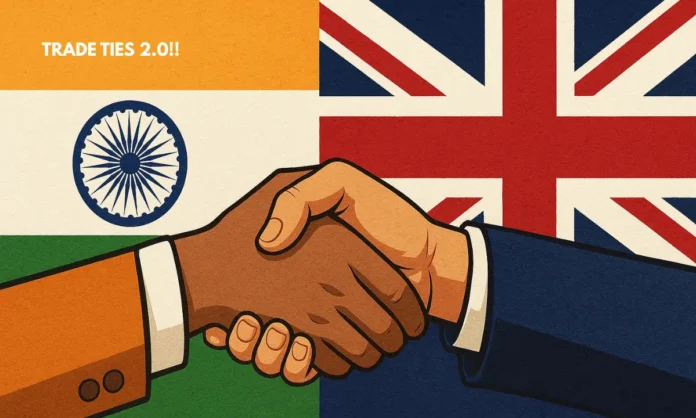Summary
- Cabinet clears India-UK Comprehensive Economic and Trade Agreement (CETA).
- The FTA aims to double bilateral trade to $120 billion by 2030.
- PM Modi to sign the pact in London during his four-day UK-Maldives visit.
A Strategic Leap in India-UK Economic Ties
India and the United Kingdom are set to redefine their economic partnership with the approval of a landmark free trade agreement (FTA). The Cabinet’s green light on Tuesday marks the culmination of years of negotiations, with the signing ceremony scheduled in London on July 24 during Prime Minister Narendra Modi’s official visit. Commerce and Industry Minister Piyush Goyal will accompany the Prime Minister to formalize the deal, which is expected to significantly enhance trade flows, reduce tariffs, and foster collaboration in services, innovation, and intellectual property.
The Comprehensive Economic and Trade Agreement (CETA) aims to eliminate customs duties on a wide range of goods, particularly labour-intensive exports from India, while making British imports like whisky and premium cars more affordable for Indian consumers. Experts see this as a vital step toward boosting bilateral trade volumes and diversifying market opportunities for Indian businesses.
🚨 Cabinet approves the FTA between India and the UK, which will be signed in London tommorow. pic.twitter.com/DA5rdALe4z
— Indian Tech & Infra (@IndianTechGuide) July 23, 2025
Key Features and Trade Impact
- Focus on Goods & Services: Tariff reductions on Indian exports such as leather, textiles, and footwear, alongside lower duties on UK luxury imports.
- Projected Trade Growth: Bilateral trade target set to double from $21 billion to $120 billion by 2030.
- Additional Frameworks: A parallel Double Contribution Convention Agreement will ease social security contributions for Indian professionals in the UK.
India’s exports to the UK climbed 12.6% to $14.5 billion in 2024-25, while imports rose modestly by 2.3% to $8.6 billion. This positive trade trajectory underscores the potential of the FTA to further unlock untapped sectors, especially in technology and innovation.
Challenges and Pending Issues
- Bilateral Investment Treaty (BIT): Negotiations are still underway and remain a crucial component of the long-term trade relationship.
- Ratification Hurdles: Post-signing, the agreement will require British parliamentary approval to take effect.
- Sectoral Adjustments: While Indian exporters stand to gain, certain domestic industries may face competition due to reduced duties on British goods.
Industry watchers emphasize the importance of aligning regulatory standards and ensuring smooth implementation to prevent bottlenecks. The social security pact, aimed at reducing financial burdens for Indian expatriates, is seen as an added incentive to expand cross-border workforce mobility.
The Road Ahead
The India-UK FTA is more than a trade pact; it signals a strategic alignment amid global supply chain shifts and post-Brexit recalibrations. By streamlining trade in goods and services and unlocking investment potential, the agreement positions both nations to navigate a volatile global economy.
If ratified smoothly, this deal could serve as a model for India’s future trade negotiations with other developed economies. With a robust roadmap extending to 2030, the agreement is poised to boost not just economic exchanges but also geopolitical ties between New Delhi and London.


